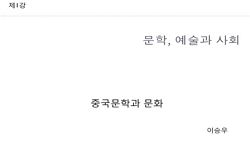The abolishment of the internship training program in Korea has become a hot issue in Korea. The internship has traditionally been a general competency build-up process to becoming a practicing doctor. However, despite its relatively long history, th...
http://chineseinput.net/에서 pinyin(병음)방식으로 중국어를 변환할 수 있습니다.
변환된 중국어를 복사하여 사용하시면 됩니다.
- 中文 을 입력하시려면 zhongwen을 입력하시고 space를누르시면됩니다.
- 北京 을 입력하시려면 beijing을 입력하시고 space를 누르시면 됩니다.
부가정보
다국어 초록 (Multilingual Abstract)
The internship has traditionally been a general competency build-up process to becoming a practicing doctor. However, despite its relatively long history, there is still no oversight or guidelines for the educational program itself. It is operated individually department-by-department on a rotation basis with no central supervision or clear goals and objectives. Very often,interns are abused as sources of simple cheap labor, performing not only medical duties but also menial administrative tasks as required by each department, without proper educational activity or training. This significant lack of system and structure is a chronic grievance among those who experience it, yet perhaps due to its short duration, is something that is endured and then forgotten.
Medical students, however, have largely opposed the abolition, citing the loss of the opportunity for anthropologic exploration of various clinical departments and the chance to build networks to pursue specialty training in the fields of their choice. The key issue at hand is then whether the current problematic student clerkship training can be improved enough to replace the internship program. To do so would require overcoming the fragmented nature of the clinical education culture, which is still quite clannish in nature and based on family values. Whether these cultural barriers can be broken to develop a clerkship training curriculum sufficient to achieve general competency before specialty training is the determining factor for the fate of the internship program.
The abolishment of the internship training program in Korea has become a hot issue in Korea.
The internship has traditionally been a general competency build-up process to becoming a practicing doctor. However, despite its relatively long history, there is still no oversight or guidelines for the educational program itself. It is operated individually department-by-department on a rotation basis with no central supervision or clear goals and objectives. Very often,interns are abused as sources of simple cheap labor, performing not only medical duties but also menial administrative tasks as required by each department, without proper educational activity or training. This significant lack of system and structure is a chronic grievance among those who experience it, yet perhaps due to its short duration, is something that is endured and then forgotten.
Medical students, however, have largely opposed the abolition, citing the loss of the opportunity for anthropologic exploration of various clinical departments and the chance to build networks to pursue specialty training in the fields of their choice. The key issue at hand is then whether the current problematic student clerkship training can be improved enough to replace the internship program. To do so would require overcoming the fragmented nature of the clinical education culture, which is still quite clannish in nature and based on family values. Whether these cultural barriers can be broken to develop a clerkship training curriculum sufficient to achieve general competency before specialty training is the determining factor for the fate of the internship program.
동일학술지(권/호) 다른 논문
-
- 대한의사협회
- 남기병
- 2013
- KCI등재후보,SCOPUS,ESCI
-
- 대한의사협회
- 이미진
- 2013
- KCI등재후보,SCOPUS,ESCI
-
- 대한의사협회
- 홍승봉
- 2013
- KCI등재후보,SCOPUS,ESCI
-
- 대한의사협회
- 최재필
- 2013
- KCI등재후보,SCOPUS,ESCI
분석정보
인용정보 인용지수 설명보기
학술지 이력
| 연월일 | 이력구분 | 이력상세 | 등재구분 |
|---|---|---|---|
| 2024 | 평가예정 | 해외DB학술지평가 신청대상 (해외등재 학술지 평가) | |
| 2021-01-01 | 평가 | 등재학술지 선정 (해외등재 학술지 평가) |  |
| 2020-12-01 | 평가 | 등재 탈락 (해외등재 학술지 평가) | |
| 2013-10-01 | 평가 | 등재학술지 선정 (기타) |  |
| 2011-01-01 | 평가 | 등재후보학술지 유지 (기타) |  |
| 2007-01-01 | 평가 | SCOPUS 등재 (신규평가) |  |
학술지 인용정보
| 기준연도 | WOS-KCI 통합IF(2년) | KCIF(2년) | KCIF(3년) |
|---|---|---|---|
| 2016 | 0.33 | 0.33 | 0.48 |
| KCIF(4년) | KCIF(5년) | 중심성지수(3년) | 즉시성지수 |
| 0.5 | 0.57 | 0.815 | 0.12 |






 KCI
KCI






